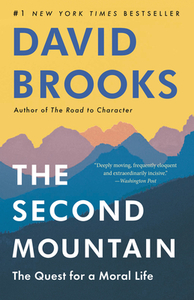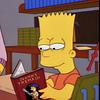Take a photo of a barcode or cover
I always look forward to Brooks's books based on book tour interviews, but then I never finish them. He starts out strong but soon starts repeating himself. I would say this book is worth a skim but maybe I should have tried to read it more deeply.
I really loved the beginning of this book and found it extremely relatable. I wish more people would read this from all walks of life, it’s a great perspective on the importance of community that has been lost. Reading this book helps to identify things in your life you can change and perspectives you can adopt to become a better person both for yourself and society. It has an interesting take on what most people find important today, often related to individualism and individual goals, and just maybe what we should find important that we have lost sight of. Highly recommend!
I kind of like the premise of The Second Mountain. The theory by Brooks is that people will go and try and climb the first mountain which is our search for the perfect career and life. Often it will be materialistic and self-serving which is necessarily bad but it won't be fulfilling. Then after reaching the top it will be empty and a tumble to a valley follows. In various ways it will feel like the complete loss of everything that you were once certain. After the pain and the emptiness, people will start climbing the second mountain in which it is possible to self-actualize in a way that serves others.
Pretty good theory, especially because it's one I identify myself with. But that was maybe the first handful of chapters. The rest is just a ramble about how society became more individualistic which was good because it allowed for more equality and a fairer world but also bad because people are less trusting of each other and given the current political climate the age of individualism perhaps looks less rosy. Then followed by Brooks' ideas on the commitments that we must all make as we climb the second mountain, vocation, marriage, religion or spirituality and community. I started to just glance by the last half of the book because the writing style and the complete lack of argumentation about anything. Brooks puts in a handful of quotes which he interprets to support his theory and offers a few pithy anecdotes. For me it read a lot like he looked back on his life and tried to trace a line through it and then fit his story to his theory and then looked for quotes and anecdotes to back him up. The most interesting parts for me were always the parts which took a study and discussed what the outcome of the study meant.
I do not recommend this at all. Better to read a short description of The Second Mountain theory but skip this book because a lot of it feels overwritten. I would recommend Mark Manson who has a much more engaging writing style (although this is probably a love/hate thing) and arrives at the same conclusions as Brooks but backed by studies and through first principles thinking.
Pretty good theory, especially because it's one I identify myself with. But that was maybe the first handful of chapters. The rest is just a ramble about how society became more individualistic which was good because it allowed for more equality and a fairer world but also bad because people are less trusting of each other and given the current political climate the age of individualism perhaps looks less rosy. Then followed by Brooks' ideas on the commitments that we must all make as we climb the second mountain, vocation, marriage, religion or spirituality and community. I started to just glance by the last half of the book because the writing style and the complete lack of argumentation about anything. Brooks puts in a handful of quotes which he interprets to support his theory and offers a few pithy anecdotes. For me it read a lot like he looked back on his life and tried to trace a line through it and then fit his story to his theory and then looked for quotes and anecdotes to back him up. The most interesting parts for me were always the parts which took a study and discussed what the outcome of the study meant.
I do not recommend this at all. Better to read a short description of The Second Mountain theory but skip this book because a lot of it feels overwritten. I would recommend Mark Manson who has a much more engaging writing style (although this is probably a love/hate thing) and arrives at the same conclusions as Brooks but backed by studies and through first principles thinking.
challenging
informative
inspiring
reflective
medium-paced
emotional
reflective
slow-paced
Strong start to this book. In fact, lots of insight. Sometimes, I felt that the narrative for how he initially defined 'the second mountain' was drifting off course. Highly recommend the first and last few chapters.
New York Times columnist David Brooks pushes back against the be-true-to-yourself worldview that marks so much of modern life, offering a path toward a meaningful life beyond self-fulfillment. Because of this, it can even serve as a useful pre-evangelism. I read everything Brooks writes and this might be his best offering yet. As I often tell friends, I always want to say more than Brooks but never less. While some readers find his writing a bit sermonic and condescending, I find it refreshing, since he explores existential questions rather than chasing the headline-driven, hot-take of the day. And in this new book, Brooks shares more about his newfound Christian faith, which before now he has been reticent to discuss publicly.
This book gave me whiplash. I had no expectations going in, just saw it available on the library app and grabbed the audiobook because yeah, I want to live a moral life! And so the book starts out VERY STRONG. I got very excited after listening to the first few chapters. It basically promises that it’s going to be full of practical advice for the modern young person from a radicalized boomer all about help finding a second career, a vocation, and a calling. Great! Let’s go!
The book immediately takes an extremely sharp turn into an entire third of the book being about having a good marriage. I’m not even joking: I had to check my phone to see if I was still listening to the same book. I actually thought there was a mistake.
The next part is about finding religion. (???)
And the final part is about the importance of community. FINE. Community building is good and he tells a couple stories that emphasize this importance, but this is no field guide to getting to work in your own community.
Anyway. What the heck even is this book?
The book immediately takes an extremely sharp turn into an entire third of the book being about having a good marriage. I’m not even joking: I had to check my phone to see if I was still listening to the same book. I actually thought there was a mistake.
The next part is about finding religion. (???)
And the final part is about the importance of community. FINE. Community building is good and he tells a couple stories that emphasize this importance, but this is no field guide to getting to work in your own community.
Anyway. What the heck even is this book?
This book slid right into my theme of examination during a year including a sabbatical. The premise is simple enough to grok. Most people work hard to establish their ego with accomplishments, material wealth, etc, and come to the same conclusion that there has to be something more/better to do with life. Brooks calls this epiphany the peak of the first mountain.
Some people live here forever, convinced that they're not settling the top of the first mountain correctly. Other people descend the mountain of self-centeredness, and ascend to a second peak. There are several options for this second ascent. This journey is marked by selflessness and commitment that endures inconvenience.
Some sections of this book were compelling. Some were a slog. The overall pacing is worth it to access Brooks unique experience and perspective. Regardless of differing reader motivations, there's something for everyone to challenge and refine their life's focus.
Some people live here forever, convinced that they're not settling the top of the first mountain correctly. Other people descend the mountain of self-centeredness, and ascend to a second peak. There are several options for this second ascent. This journey is marked by selflessness and commitment that endures inconvenience.
Some sections of this book were compelling. Some were a slog. The overall pacing is worth it to access Brooks unique experience and perspective. Regardless of differing reader motivations, there's something for everyone to challenge and refine their life's focus.
Very long book. One that doesn’t convince me the author knows what he is talking about. It isn’t very precise. It is almost on the edge of ranting. Furthermore, I don’t believe I can learn about my vocation through reading. I am fully aware that a career in its classical sense isn’t enough to feel meaning in my life. But I don’t need 400 pages to convince me so. I already know.
I am actively seeking my vocation in my daily life and so perhaps this book would have been great a few years back when I didn’t do so. It might then have been a wake up call. But note it is nothing but a waste of time
I am actively seeking my vocation in my daily life and so perhaps this book would have been great a few years back when I didn’t do so. It might then have been a wake up call. But note it is nothing but a waste of time


